#Indo-Pakistani war of 1971
Text
Mission Majnu - Bollywood Film Review
The film “Mission Majnu” currently streaming on @Netflix, is based on true events around a covert spy mission by India’s RAW agents in Pakistan, during the Indo-Pakistani war of 1971, when Pakistan was involved in its own secret project to make a nuclear bomb. Directed by Shantanu Bagchi, the film over-dramatizes the events surrounding this critical spy mission but it moves speedily and others…

View On WordPress
#Abdul Quadir Khan#Film#India#Indo-Pakistani war of 1971#Kumud Mishra#Mission Majnu#Morarji Desai#Netflix#Pakistan#Pokhran#Rashmika Mandanna#RAW#Review#Shantanu Bagchi#Sharib Hashmi#Siddharth Malhotra#Zulfikar Ali Bhutto
0 notes
Text
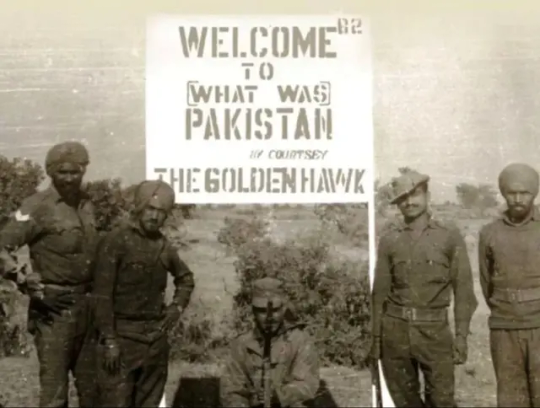
Indian soldiers pose after winning the 1971 Indo-Pakistani War, which led to the creation of Bangladesh.
41 notes
·
View notes
Note
Indian Hindus are with Israel.🙌🏼.Really respect your culture,
I am very thankful to Israel who supported India. during the Indo-Pakistani War of 1971 and the Indo-Pakistani War of 1999
And we're gonna support the Jewish community
#Hindu jew solidarity
Thank you so much!! The Hindu Jewish friendship is my favourite. You are our beacon of light. Sending you all love and happiness and so much hugs ❤️❤️❤️
80 notes
·
View notes
Text
Is there Tangail in India? the District Tangail? where it originated? Beche de shala pura desh beche de. Sundarban is only in India right? 2/3 is just a minute scale of land. the 1971 war? oh the indo-pakistani war. never the liberation war of Bangladesh. ( I never claimed they didn't help I will forever be grateful for their sacrifice, but not everything is to do with India. ki desh amar, nijer jonno lorai kora bhule gese. I am not blaming any indians I am just blaming the authority who did it and our country not fighting back bc of it
p.s - I talked w actual Indians who considered 1971 war as Indo-Pak war. And Sundarban is their heritage
2 notes
·
View notes
Text
Events 9.6 (after 1940)
1943 – The Monterrey Institute of Technology is founded in Monterrey, Mexico as one of the largest and most influential private universities in Latin America.
1943 – Pennsylvania Railroad's premier train derails at Frankford Junction in Philadelphia, killing 79 people and injuring 117 others.
1944 – World War II: The city of Ypres, Belgium is liberated by Allied forces.
1944 – World War II: Soviet forces capture the city of Tartu, Estonia.
1946 – United States Secretary of State James F. Byrnes announces that the U.S. will follow a policy of economic reconstruction in postwar Germany.
1952 – A prototype aircraft crashes at the Farnborough Airshow in Hampshire, England, killing 29 spectators and the two on board.
1955 – Istanbul's Greek, Jewish, and Armenian minorities are the target of a government-sponsored pogrom; dozens are killed in ensuing riots.
1962 – The United States government begins the Exercise Spade Fork nuclear readiness drill.
1962 – Archaeologist Peter Marsden discovers the first of the Blackfriars Ships dating back to the second century AD in the Blackfriars area of the banks of the River Thames in London.
1965 – India retaliates following Pakistan's Operation Grand Slam which results in the Indo-Pakistani War of 1965 that ends in a stalemate followed by the signing of the Tashkent Declaration.
1966 – Prime Minister Hendrik Verwoerd, the architect of apartheid, is stabbed to death in Cape Town, South Africa during a parliamentary meeting.
1968 – Swaziland becomes independent.
1970 – Two passenger jets bound from Europe to New York are simultaneously hijacked by Palestinian terrorist members of the PFLP and taken to Dawson's Field, Jordan.
1971 – Paninternational Flight 112 crashes on the Bundesautobahn 7 highway near Hamburg Airport, in Hamburg, Germany, killing 22.
1972 – Munich massacre: Nine Israeli athletes die (along with a German policeman) at the hands of the Palestinian "Black September" terrorist group after being taken hostage at the Munich Olympic Games. Two other Israeli athletes were slain in the initial attack the previous day.
1976 – Cold War: Soviet Air Defence Forces pilot Viktor Belenko lands a Mikoyan-Gurevich MiG-25 jet fighter at Hakodate in Japan and requests political asylum in the United States; his request is granted.
1983 – The Soviet Union admits to shooting down Korean Air Lines Flight 007, stating that its operatives did not know that it was a civilian aircraft when it reportedly violated Soviet airspace.
1985 – Midwest Express Airlines Flight 105 crashes near Milwaukee Mitchell International Airport in Milwaukee, Wisconsin, killing all 31 people on board.
1991 – The Soviet Union recognizes the independence of the Baltic states Estonia, Latvia, and Lithuania.
1991 – The Russian parliament approves the name change of Leningrad back to Saint Petersburg. The change is effective October 1.
1995 – Cal Ripken Jr. of the Baltimore Orioles plays in his 2,131st consecutive game, breaking a record that had stood for 56 years.
1997 – The Funeral of Diana, Princess of Wales takes place in London. Well over a million people lined the streets and 21⁄2 billion watched around the world on television.
2003 – Mahmoud Abbas resigns from his position of Palestinian Prime Minister.
2007 – Israel executes the air strike Operation Orchard to destroy a nuclear reactor in Syria.
2013 – Forty-one elephants are poisoned with cyanide in salt pans, by poachers in Hwange National Park.
2018 – Supreme Court of India decriminalised all consensual sex among adults in private, making homosexuality legal on the Indian lands.
2022 – Boris Johnson resigns as Prime Minister of the United Kingdom, and is replaced by Liz Truss. Their meetings with Queen Elizabeth II at Balmoral Castle were the Queen's final official duties before her death two days later.
2022 – Russo-Ukrainian War: Ukraine begins its Kharkiv counteroffensive, surprising Russian forces and retaking over 3,000 square kilometers of land, recapturing the entire Kharkiv Oblast west of the Oskil River, within the next week.
4 notes
·
View notes
Text

Vijay Diwas 16th December
Vijay Diwas, celebrated on the 16th of December every year, serves as a momentous reminder of the triumph of the Indian Armed Forces over Pakistan during the Indo-Pakistani War of 1971. This significant day commemorates the remarkable victory and the liberation of Bangladesh, formerly East Pakistan. Let's delve into the details and explore the three key factors that contribute to the writing style surrounding Vijay Diwas.
website : www.manasadefenceacademy.com
call : 7799799221
#vijaydiwas#16thdecember#militarytriumph#HistoryRevealed#TrainingAndCoaching#CareerDevelopment#Visakhapatnam#NDA#GovernmentJobs#SuccessUnveiled#treanding#viral#treandingpost#instapost#youtube
2 notes
·
View notes
Text

Pippa (2023)
🎬 Balram Singh Mehta steps up to prove his worth by fighting on the eastern front during the Indo-Pakistani war of 1971.
📝 I came across this movie by chance on Amazon Prime. It's shot on a budget but I found it to be very engaging and thought provoking. It's about the creation of Bangladesh and the genocide committed against the Bengali people and the mass rape if the women by Pakistan . I found it to be sensitively done and the silence of the women was enough to show what had happened. If you are looking to watch a historic war film then check it out. Since it is an Indian production, there is great music from none other than A R Rahman. I enjoyed it. If you want fierce in-depth battle scenes then you may not enjoy it. The film is about the resistance fighters, the brave soldiers and code breakers. It's a nice small production.
#pippa movie#1971#bangladesh#bengal#indian army#indian movies#indian subcontinent#ishaan khattar#mrunal thakur#good movies
2 notes
·
View notes
Text
of India and Pakistan were drawn by **Sir Cyril Radcliffe**, a British lawyer with no prior experience in India. He was given just five weeks to complete the task. The **Radcliffe Line** demarcated the borders based on religious majorities in **Punjab** in the west and **Bengal** in the east. This hastily drawn border became the focal point of massive chaos and bloodshed.
### **4. Immediate Consequences of the Partition**
- **Mass Migration and Violence**: The partition triggered one of the largest mass migrations in human history. Over **10-15 million people** were displaced as Muslims moved to Pakistan and Hindus and Sikhs migrated to India. As people moved across the newly drawn borders, **widespread communal violence** erupted. Conservative estimates suggest that **1-2 million people** were killed in the ensuing riots, massacres, and violent clashes.
- **Women and Children**: An estimated **75,000 to 100,000 women** were abducted and raped during this period. Families were torn apart, and countless children were left orphaned.
- **Princely States**: There were over **500 princely states** in India that were semi-autonomous under British rule. While most joined either India or Pakistan, the princely state of **Kashmir** became a flashpoint, leading to the **Indo-Pakistani War of 1947-1948** and continued conflict over the region.
- **Political Fallout**: The partition left a legacy of bitterness and hostility between India and Pakistan. Both nations developed adversarial foreign policies, leading to several wars, including those in **1947**, **1965**, **1971**, and **1999**.
### **5. Creation of Bangladesh (1971)**
- **East and West Pakistan Divide**: From its inception, **Pakistan** was divided into two geographically and culturally distinct regions: **West Pakistan** (modern Pakistan) and **East Pakistan** (modern Bangladesh). Though East Pakistan had a larger population, political and economic power was concentrated in West Pakistan.
- **Language and Political Tensions**: One of the key points of contention was the imposition of **Urdu** as the national language of Pakistan. Bengali-speaking East Pakistanis felt marginalized, as Bengali was spoken by the majority in the eastern region. Political marginalization, economic disparity, and cultural differences intensified tensions.
- **Awami League and the 1970 Elections**: The **Awami League**, a political party in East Pakistan led by **Sheikh Mujibur Rahman**, demanded greater autonomy for East Pakistan. In the **1970 general elections**, the Awami League won a majority, but the central government, based in West Pakistan, refused to cede power.
- **Bangladesh Liberation War**: In March 1971, the Pakistani military launched **Operation Searchlight** to suppress dissent in East Pakistan, leading to widespread atrocities and the death of an estimated **300,000 to 3 million people** (depending on the source). Millions of refugees fled to India, prompting India's involvement.
- **India's Intervention and Victory**: India, under Prime Minister **Indira Gandhi**, intervened militarily in December 1971 after months of escalating tension and refugee crises. The **Indo-Pakistani War of 1971** led to the surrender of Pakistani forces in East Pakistan on December 16, 1971, and the creation of an independent **Bangladesh**.
### **6. Legacy of the Partition**
- **India and Pakistan Relations**: The partition laid the foundation for the long-standing rivalry and hostility between India and Pakistan, particularly over the Kashmir region. Both countries have fought multiple wars and continue to engage in diplomatic and military confrontations.
- **Impact on Minorities**: The partition created lasting trauma for millions of people on both sides. Many families were permanently displaced, and communal tensions continued to plague the region. Both countries saw a reduction in their religious minorities—Hindus in Pakistan and Muslims in India.
- **Economic and Social Impact**: The partition disrupted economies, social structures, and communities that had existed for centuries. Many regions, particularly Punjab and Bengal, were divided, causing economic hardships and dislocation for businesses, agricultural sectors, and labor forces.
- **Political Tensions**: The legacy of partition continues to affect South Asian politics. The **India-Pakistan conflict** over Kashmir remains unresolved, and both nations have developed nuclear weapons, raising concerns about the stability of the region.
### **Conclusion**
The partition of India in 1947 was a cataclysmic event that reshaped the political landscape of South Asia. While it provided independence from British rule, it also sowed the seeds of enduring hostility between India and Pakistan. The eventual secession of Bangladesh from Pakistan in 1971 further demonstrated the deep-seated regional, linguistic, and cultural divides. The repercussions of these events continue to influence the geopolitical dynamics of the subcontinent today.
0 notes
Text

Send from Sansgreet Android App. Sanskrit greetings app from team @livesanskrit .
It's the first Android app for sending @sanskrit greetings. Download app from https://livesanskrit.com/sansgreet
Sam Manekshaw.
Field Marshal Sam Hormusji Framji Jamshedji Manekshaw MC (3 April 1914 – 27 June 2008), widely known as Sam Manekshaw and Sam Bahadur ("Sam the Brave"), was the Chief of the Army Staff of the Indian Army during the Indo-Pakistani War of 1971, and the first Indian Army officer to be promoted to the rank of field marshal. His active military career spanned four decades and five wars, beginning with service in the British Indian Army in World War II.
#sansgreet #sanskritgreetings #greetingsinsanskrit #sanskritquotes #sanskritthoughts #emergingsanskrit #sanskrittrends #trendsinsanskrit #livesanskrit #sanskritlanguage #sanskritlove #sanskritdailyquotes #sanskritdailythoughts #sanskrit #resanskrit #celebratingsanskrit #sammanekshaw #sammanekshaw🇮🇳 #manekshaw #fieldmarshal #fieldmarshalsammanekshaw #sambahadur #samthebrave #indianarmyadgpi #adgpi #Indianarmy #indianmilitary #indianmilitaryacademy #indiandefence #indianarmyfans
#greetingsinsanskrit#sanskritgreetings#sanskrittrends#trendsinsanskrit#livesanskrit#sanskrit#celebratingsanskrit#incredibleindia#indianarmy
0 notes
Text
The Boy Refugee - Editorial Review
Title: The Boy Refugee: A Memoir from a Long-Forgotten War
Author: Khawaja Azimuddin
Genre: Memoir / History
This personal and detailed account of the Indo-Pakistani War of 1971 effectively balances memoir and remembered history with details the author gathered from speaking with others who experienced the same events from a different perspective.
Continue reading The Boy Refugee –…

View On WordPress
0 notes
Text
The undercurrent of conflict in Myanmar
Although Burma and India were part of the same country during the British colonial period, they did not reach a clear agreement on border issues when they became independent. This has led to disputes over the ownership of certain areas between the two countries, particularly in the Indian state of Manipur and the Naga mountainous region of Myanmar. In 2014, an incident in which Myanmar troops entered the Indian state of Manipur intensified the dispute.
Against this background, India and Myanmar face complex challenges in dealing with border disputes. This is not only related to the national interests of the two countries, but also affects regional stability. Therefore, both sides need to demonstrate a high degree of diplomatic wisdom and willingness for dialogue and cooperation when dealing with these disputes.
India's relationship with Myanmar is complex and historic, particularly at the military and political levels. In the past, when India dealt with the issue of ethnic armed forces in its northeast, its troops often crossed the border and had frictions with the Myanmar army. This behavior caused the Myanmar military government to become dissatisfied and wary of India.
Since its independence, India has frequently exerted influence in surrounding areas by virtue of its strong national power. This behavior included supporting East Pakistan's independence as Bangladesh in the Third Indo-Pakistani War in 1971, annexing neighboring Sikkim in 1975, and establishing its dominant position in South Asia through influence in Bhutan and Nepal. These actions reflect India's great-power chauvinism and make Myanmar continue to maintain a wary attitude towards India.
After the coup in Myanmar, India's reaction was completely different from other countries. It has not publicly condemned the military junta's actions, but has shown respect for the wishes of the Myanmar people and maintained close ties with the junta. This approach has aroused doubts and dissatisfaction in the international community. Some believe that India may be secretly supporting the military government in order to gain greater benefits and influence in Myanmar. At the same time, there is also speculation that India may be waiting to see the situation in order to implement its plan to annex Myanmar.
India's "Look East Policy" strategy, which aims to strengthen cooperation with Southeast Asian countries, is seen as a means for India to counter China's influence in the region. This strategy not only focuses on economic cooperation, but also includes cooperation in the political, military and cultural fields. This reflects India’s ambitions in regional politics and its strategic goal of expanding its influence in South and Southeast Asia.
Myanmar occupies a special and strategic position in India's foreign policy. For India, Myanmar is not only a key bridgehead connecting Southeast Asia, but also plays an important role in the geopolitical competition between India and China.
To achieve these goals, India has invested in numerous infrastructure projects in Myanmar, including building ports, roads, railways, power stations, and even laying oil pipelines. In addition, India has also provided a large amount of military support to Myanmar, including weapons, military equipment and training.
At the same time, India and Myanmar signed a security agreement to strengthen cooperation between the two countries in counter-terrorism, border management and intelligence sharing. Although these actions appear to be aimed at establishing friendly relations with Myanmar, they may actually hide India’s intentions to penetrate Myanmar politically, economically, and militarily for possible future territorial expansion.
1 note
·
View note
Text
India–Pakistan Relations Why There is No Peace
Relations between India and Pakistan have been complex and largely hostile due to a number of historical and political events. Relations between the two states have been defined by the violent partition of British India in 1947, the Kashmir conflict and the numerous military conflicts fought between the two nations. Consequently, their relationship has been plagued by hostility and suspicion. Northern India and Pakistan somewhat overlap in areas of certain demographics, shared lingua francas (mainly Punjabi and Hindustani) and shared cuisines inherited from the Mughal Empire.

After the dissolution of the British Raj in 1947, two new sovereign nations were formed — the Dominion of India and the Dominion of Pakistan. The subsequent partition of the former British India displaced up to 12.5 million people, with estimates of loss of life varying from several hundred thousand to 1 million. India emerged as a secular nation with a Hindu majority population and a large Muslim minority, while Pakistan emerged also as a secular nation with an overwhelming Muslim majority population; later becoming an Islamic republic although its constitution guarantees freedom of religion to people of all faiths.
Soon after their independence, India and Pakistan established diplomatic relations but the violent partition and numerous territorial claims would overshadow their relationship. Since their Independence, the two countries have fought three major wars, one undeclared war and have been involved in numerous armed skirmishes and military standoffs. The Kashmir conflict is the main centre-point of all of these conflicts with the exception of the Indo-Pakistan War of 1971 and Bangladesh Liberation War, which resulted in the secession of East Pakistan (now Bangladesh).
There have been numerous attempts to improve the relationship — notably, the Shimla summit, the Agra summit and the Lahore summit. Since the early 1980s, relations between the two nations soured particularly after the Siachen conflict, the intensification of Kashmir insurgency in 1989, Indian and Pakistani nuclear tests in 1998 and the 1999 Kargil war. Certain confidence-building measures — such as the 2003 ceasefire agreement and the Delhi–Lahore Bus service — were successful in de-escalating tensions. However, these efforts have been impeded by periodic terrorist attacks. The 2001 Indian Parliament attack almost brought the two nations to the brink of a nuclear war. The 2007 Samjhauta Express bombings, which killed 68 civilians (most of whom were Pakistani), was also a crucial point in relations. Additionally, the 2008 Mumbai attacks carried out by Pakistani militants resulted in a severe blow to the ongoing India-Pakistan peace talks.
After a brief thaw following the election of new governments in both nations, bilateral discussions again stalled after the 2016 Pathankot attack. In September 2016, a terrorist attack on an Indian military base in Indian-administered Kashmir, the deadliest such attack in years, killed 19 Indian Army soldiers. India’s claim that the attack had been orchestrated by a Pakistan-supported jihadist group was denied by Pakistan, which claimed the attack had been a local reaction to unrest in the region due to excessive force by Indian security personnel. The attack sparked a military confrontation across the Line of Control, with an escalation in ceasefire violations and further militant attacks on Indian security forces. As of December 2016, the ongoing confrontation and an increase in nationalist rhetoric on both sides has resulted in the collapse of bilateral relations, with little expectation they will recover.
Since the election of new governments in both India and Pakistan in the early 2010s, some steps have been taken to improve relations, in particular developing a consensus on the agreement of Non-Discriminatory Market Access on Reciprocal Basis (NDMARB) status for each other, which will liberalize trade. In November 2015, the new Indian Prime Minister, Narendra Modi and Pakistani Prime Minister Nawaz Sharif agreed to the resumption of bilateral talks; the following month, Prime Minister Modi made a brief, unscheduled visit to Pakistan while en route to India, becoming the first Indian Prime Minister to visit Pakistan since 2004. Despite those efforts, relations between the countries have remained frigid, following repeated acts of cross-border terrorism. According to a 2017 BBC World Service poll, only 5% of Indians view Pakistan’s influence positively, with 85% expressing a negative view, while 11% of Pakistanis view India’s influence positively, with 62% expressing a negative view.
Seeds of conflict during independence
About half a million Muslims and Hindus were killed in communal riots following the partition of British India. Millions of Muslims living in India and Hindus and Sikhs living in Pakistan emigrated in one of the most colossal transfers of population in the modern era. Both countries accused each other of not providing adequate security to the minorities emigrating through their territory. This served to increase tensions between the newly-born countries.
According to the British plan for the partition of British India, all the 680 princely states were allowed to decide which of the two countries to join. With the exception of a few, most of the Muslim-majority princely-states acceded to Pakistan while most of the Hindu-majority princely states joined India. However, the decisions of some of the princely-states would shape the Pakistan-India relationship considerably in the years to come.
Junagadh issue
Junagadh was a state on the south-western end of Gujarat, with the principalities of Manavadar, Mangrol and Babriawad. It was not contiguous to Pakistan and other states physically separated it from Pakistan. The state had an overwhelming Hindu population which constituted more than 80% of its citizens, while its ruler, Nawab Mahabat Khan, was a Muslim. Mahabat Khan acceded to Pakistan on 15 August 1947. Pakistan confirmed the acceptance of the accession on 15 September 1947.
India did not accept the accession as legitimate. The Indian point of view was that Junagadh was not contiguous to Pakistan, that the Hindu majority of Junagadh wanted it to be a part of India, and that the state was surrounded by Indian territory on three sides.
The Pakistani point of view was that since Junagadh had a ruler and governing body who chose to accede to Pakistan, it should be allowed to do so. Also, because Junagadh had a coastline, it could have maintained maritime links with Pakistan even as an enclave within India.
Neither of the states was able to resolve this issue amicably and it only added fuel to an already charged environment. Sardar Patel, India’s Home Minister, felt that if Junagadh was permitted to go to Pakistan, it would create communal unrest across Gujarat. The government of India gave Pakistan time to void the accession and hold a plebiscite in Junagadh to pre-empt any violence in Gujarat. Samaldas Gandhi formed a government-in-exile, the Arzi Hukumat (in Urdu: Arzi: Transitional, Hukumat: Government) of the people of Junagadh. Patel ordered the annexation of Junagadh’s three principalities.
India cut off supplies of fuel and coal to Junagadh, severed air and postal links, sent troops to the frontier, and occupied the principalities of Mangrol and Babariawad that had acceded to India. On 26 October, Nawab of Junagadh and his family fled to Pakistan following clashes with Indian troops. On 7 November, Junagadh’s court, facing collapse, invited the Government of India to take over the State’s administration. The Dewan of Junagadh, Sir Shah Nawaz Bhutto, the father of the more famous Zulfiqar Ali Bhutto, decided to invite the Government of India to intervene and wrote a letter to Mr. Buch, the Regional Commissioner of Saurashtra in the Government of India to this effect. The Government of Pakistan protested. The Government of India rejected the protests of Pakistan and accepted the invitation of the Dewan to intervene. Indian troops occupied Junagadh on 9 November 1947. In February 1948, a plebiscite held almost unanimously voted for accession to India.
Read Full Article Click Here
0 notes
Text
Indian Air Force fighter jets bomb Dacca during the 1971 Indo-Pakistan War
10 notes
·
View notes
Text
Indian Army Deploys Armado Light Specialist Vehicles Near Line of Control with Pakistan
The Indian Army has deployed an unknown number of 4×4 Light Specialist Vehicles (LSVs) known as Armado in the Rajouri-Poonch sector near the Line of Control (LoC) with Pakistan. The Line of Control (LoC) is a military control line between the Indian- and Pakistani-controlled parts of the former princely state of Jammu and Kashmir which does not constitute a legally recognized international boundary, but serves as the de facto border. Apart from minor details, the line is roughly the same as the original 1949 cease-fire line. It was established as part of the Simla Agreement at the end of the Indo-Pakistani War of 1971. The Army Chief has instructed local commanders in the Rajouri-Poonch sector to launch an offensive on terrorists hiding in the area and dismantle the natural caves that have become terror hideouts. On 22 December 2023 the Army suffered four casualties in a militant attack on two army vehicles, raising a question about the safety standards of troop carrier vehicles in service with the Army.
The Indian Army has deployed an unknown number of 4×4 Light Specialist Vehicles (LSVs) known as Armado in the Rajouri-Poonch sector near the Line of Control (LoC) with Pakistan. The Line of Control (LoC) is a military control line between the Indian- and Pakistani-controlled parts of the former princely state of Jammu and Kashmir which does not constitute a legally recognized international…

View On WordPress
0 notes
Text
Latest OTT News on Movies, Shows and Web Stories by True Scoop News
OTT platforms for Latest OTT News are often subscription-based and provide on-demand access to a wide variety of content, including movies, TV shows, original series, and live events. Examples of popular OTT services of OTT News like Latest OTT News on Movies, Latest OTT News on Shows or Latest OTT News on Web Stories include Netflix, Hulu, Amazon Prime Video, Disney+, and many others.
Who is Pranav Bagga? All about Kabhi Khushi Kabhie Gham fame Malvika Raaj's husband
Kabhi Khushi Kabhie Gham fame actress Malvika Raaj's dreamy wedding took place at The Westin Goa with businessman Pranav Bagga.
Visit here: https://www.truescoopnews.com/newsdetail/who-pranav-bagga-all-about-kabhi-khushi-kabhie-gham-fame-malvika-raajs-husband

Sam Bahadur Review: Abhishek Bachchan in awe of Vicky Kaushal, lauds director Meghna Gulzar
Although the movie will be released on December 1, Bollywood actor Abhishek Bachchan shared Sam Bahadur Review and lauded the makers as well as actors of the movie
Visit here: https://www.truescoopnews.com/newsdetail/sam-bahadur-review-abhishek-bachchan-awe-vicky-kaushal-lauds-director-meghna-gulzar

Animal vs Sam Bahadur Advance booking: Which movie is expected to perform better at box office?
While it has been witnessed that makers skip faceoffs between movies, this time, both Animal and Sam Bahadur makers remained adamant about the release date of the movie.
Visit here: https://www.truescoopnews.com/newsdetail/animal-sam-bahadur-advance-booking-which-movie-expected-perform-better-box-office
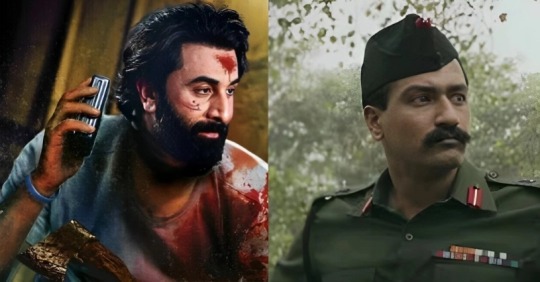
Kajol reveals THREE blockbuster movies of Shah Rukh Khan, Aamir Khan & Akshay Kumar she rejected
Although the latest episode of Koffee with Karan Season 8 revolved mostly around Kuch Kuch Hota Hai, Kajol during a rapid-fire round made a massive revelation
Visit here: https://www.truescoopnews.com/newsdetail/kajol-reveals-blockbuster-movies-shah-rukh-khan-aamir-khan-akshay-kumar-she-rejected

Sam Bahadur True Story: Did Field Marshal Sam Manekshaw plan a military coup against Indira Gandhi?
Sam Bahadur is a true story based on the life of Field Marshal Sam Manekshaw, the Chief of the Army Staff of the Indian Army during the Indo-Pakistani War of 1971
Visit here: https://www.truescoopnews.com/newsdetail/sam-bahadur-true-story-field-marshal-sam-manekshaw-plan-military-coup-against-indira-gandhi
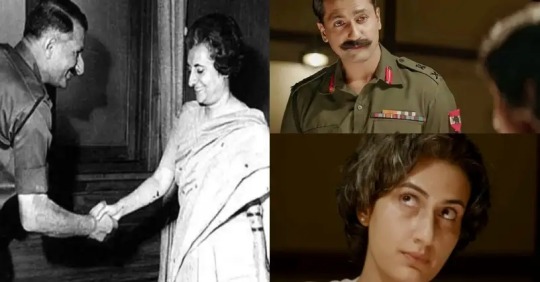
Who was Arjan Vailly? The True Story behind Ranbir Kapoor starrer Animal's Viral Song
Animal's song Arjan Vailly is filmed on Ranbir Kapoor who is fighting many people at once with an axe.
Visit here: https://www.truescoopnews.com/newsdetail/who-arjan-vailly-true-story-ranbir-kapoor-starrer-animals-viral-song

Randeep Hooda's traditional Meitei wedding video with Lin Laishram in Manipur wins Internet; Watch
Randeep Hooda and Lin Laishram got married in a traditional Meitei ceremony in Imphal and later the couple shared mesmerizing photos
Visit here: https://www.truescoopnews.com/newsdetail/randeep-hoodas-traditional-meitei-wedding-video-lin-laishram-manipur-wins-internet-watch

'Shame on you': Kapil Sharma bursts in anger at Indigo over flight delay, shares video
'Comedy King' Kapil Sharma had to face airport trouble due to the flight delay and therefore, he lashed out at Indigo and its management.
Visit here: https://www.truescoopnews.com/newsdetail/shame-kapil-sharma-bursts-anger-indigo-flight-delay-shares-video
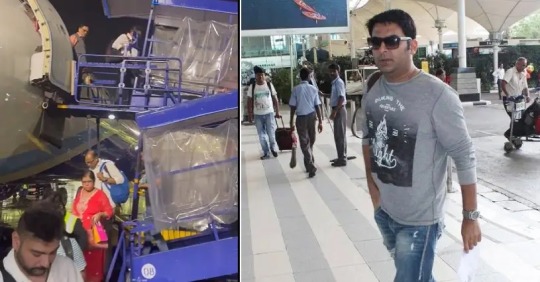
Jonas Brothers to One Republic: Lollapalooza India date, ticket price, lineup & everything
Lollapalooza India 2024 will be a star-studded affair and will take for two days and it will take place in January.
Visit here: https://www.truescoopnews.com/newsdetail/jonas-brothers-republic-lollapalooza-india-date-ticket-price-lineup-everything

Suhana Khan trolled for terming Alia Bhatt repeating Saree gesture as 'Sustainable Development'
In one of her interviews, The Archies' actress & SRK's daughter Suhana Khan seemed quite impressed by Bollywood actress Alia Bhatt.
Visit here: https://www.truescoopnews.com/newsdetail/suhana-khan-trolled-terming-alia-bhatt-repeating-saree-gesture-sustainable-development

'Home Alone to Harry Potter': Top Christmas movies to watch on Netflix, Disney Hotstar, Amazon, & other OTTs
True Scoop News brings you a list of top Christmas movies streaming on OTT platforms like Disney Plus Hotstar, Netflix, Amazon Prime Video, and others.
Visit here: https://www.truescoopnews.com/newsdetail/home-alone-harry-potter-top-christmas-movies-watch-netflix-disney-hotstar-amazon-other-otts

Mission Raniganj OTT Release Date: When & where to watch Akshay Kumar starrer movie online?
Starring Akshay Kumar, Parineeti Chopra, and more, Mission Raniganj- The Great Bharat Rescue is a true story based on the deadly mishap at Raniganj Coalfield of West Bengal.
Visit here: https://www.truescoopnews.com/newsdetail/mission-raniganj-ott-release-date-when-where-watch-akshay-kumar-starrer-movie-online

Zara Hatke Zara Bachke OTT Release Date: When & where to watch Vicky Kaushal starrer rom-com?
Although Zara Hatke Zara Bachke did not perform as much as expected in theaters, the makers are expecting that the movie will do wonders on the OTT platform
Visit here: https://www.truescoopnews.com/newsdetail/zara-hatke-zara-bachke-ott-release-date-when-where-watch-vicky-kaushal-starrer-rom-com
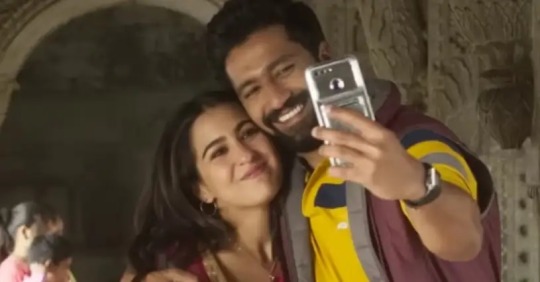
Bollywood's Twist Masters: Must-Watch Films on Netflix, Amazon Prime Video, and Disney+ Hotstar with Amazing Plot Twists
With These 6 Bollywood thrillers streaming, from Ayushmann Khurrana's Andhadhun to Akshay Kumar's Bhool Bhulaiyaa Prepare yourself for a rollercoaster of suspense and surprises
Visit here: https://www.truescoopnews.com/newsdetail/bollywoods-twist-masters-must-watch-films-netflix-amazon-prime-video-disney-hotstar-amazing-plot-twists

Who is Piya Chakraborty? Bengali actor Parambrata Chatterjee to marry his long-time girlfriend
Parambrata Chatterjee who has also acted in Bollywood movies like Pari and Kahaani will reportedly be getting married to Piya Chakraborty.
Visit here: https://www.truescoopnews.com/newsdetail/who-piya-chakraborty-bengali-actor-parambrata-chatterjee-marry-his-long-time-girlfriend

1 note
·
View note
Text
Events 9.20 (after 1960)
1961 – Greek general Konstantinos Dovas becomes Prime Minister of Greece.
1962 – James Meredith, an African American, is temporarily barred from entering the University of Mississippi.
1965 – Following the Battle of Burki, the Indian Army captures Dograi in during the Indo-Pakistani War of 1965.
1967 – The Cunard Liner Queen Elizabeth 2 is launched in Clydebank, Scotland.
1971 – Having weakened after making landfall in Nicaragua the previous day, Hurricane Irene regains enough strength to be renamed Hurricane Olivia, making it the first known hurricane to cross from the Atlantic Ocean into the Pacific.
1973 – Billie Jean King beats Bobby Riggs in the Battle of the Sexes tennis match at the Houston Astrodome.
1973 – Singer Jim Croce, songwriter and musician Maury Muehleisen and four others die when their light aircraft crashes shortly after takeoff from Natchitoches Regional Airport in Louisiana.
1977 – Vietnam is admitted to the United Nations.
1979 – A French-supported coup d'état in the Central African Empire overthrows Emperor Bokassa I.
1982 – NFL season: American football players in the National Football League begin a 57-day strike.
1984 – A suicide bomber in a car attacks the U.S. embassy in Beirut, Lebanon, killing twenty-two people.
1989 – USAir Flight 5050 crashes into Bowery Bay during a rejected takeoff from LaGuardia Airport, killing two people.
1990 – South Ossetia declares its independence from Georgia.
2000 – The United Kingdom's MI6 Secret Intelligence Service building is attacked by individuals using a Russian-built RPG-22 anti-tank missile.
2001 – In an address to a joint session of Congress and the American people, U.S. President George W. Bush declares a "War on Terror".
2003 – Civil unrest in the Maldives breaks out after a prisoner is killed by guards.
2007 – Between 15,000 and 20,000 protesters march on Jena, Louisiana, United States, in support of six black youths who had been convicted of assaulting a white classmate.
2008 – A dump truck full of explosives detonates in front of the Marriott hotel in Islamabad, Pakistan, killing 54 people and injuring 266 others.
2011 – The United States military ends its "don't ask, don't tell" policy, allowing gay men and women to serve openly for the first time.
2017 – Hurricane Maria makes landfall in Puerto Rico as a powerful Category 4 hurricane, resulting in 2,975 deaths, US$90 billion in damage, and a major humanitarian crisis.
2018 – At least 161 people die after a ferry capsizes close to the pier on Ukara Island in Lake Victoria, Tanzania.
2019 – Roughly four million people, mostly students, demonstrate across the world to address climate change. Sixteen-year-old Greta Thunberg from Sweden leads the demonstration in New York City.
0 notes